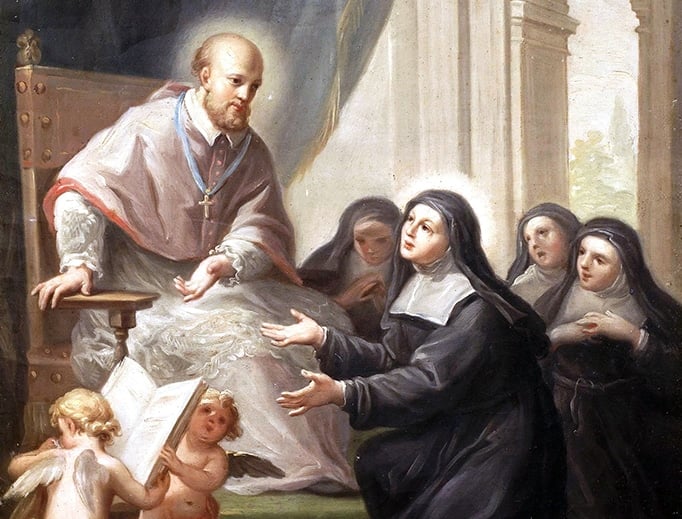
Holiness
In my years as a chaplain, I was often asked whether holiness is actually attainable in the ordinary –and perhaps at times, mundane – life we live on a daily basis. And my reply would often be to consider the lives of the saints – those who have gone before us, faced the temptations of the world and many spiritual battles to emerge (unscathed or not) as witnesses of extraordinary holiness.
In so many cases – these lives lived in exemplary service to God – played out, often unnoticed in the ordinary circumstances of life. And in other cases – like St Joan of Arc, or St Peter – they were very public witnesses to holiness.
So, how exactly do we do this holiness “thing”? How do we live our day-to-day lives in holiness?
The saints show us what’s possible for us
Firstly, let’s not forget the call to holiness we received in Baptism and the graces bestowed for our sanctification. In our baptism we are individually called and invited to participate in the life of the Divine Trinity. The theological virtues – of faith, hope and love – are gifted to us. We are incorporated into the life of the Church, consecrated as children of God and invited to actively participate in the three-fold mission of the Church as priests, prophets and kings.
Essentially what this means is that at baptism we have been given the weapons, so-to-speak, to live holiness, and so what we now need is to learn how to use them.
On a practical level, what does this look like? I’d like to suggest three key practical ways to sanctify our everyday life.

Prayer
Prayer is the arena where we converse with God, where we communicate with the One Who created us. This is where we build our relationship with God, where we come to understand Him more through the Scriptures, and experience the depth of His love for us. The Liturgy of the Hours, time for mental prayer, praying the Holy Rosary and meditating on Scripture through Lectio Divina, are all wonderful ways in which we can come to know the Heart of God more deeply.
Carve time into your day devoted especially to prayer. In these times when we seem to have so much more time available to us – but also when it might seem like there are so many distractions beckoning – it’s opportune to cultivate a life of prayer. Silence is important to listening to God, and so is the contemplation of the Word of God. Factor prayer time into your day and stick to it.

Sacraments
The Sacraments are “efficacious signs of grace, instituted by Christ and entrusted to the Church, by which divine life is dispensed to us.” (CCC, 1131) In and through the sacraments, God dispenses His very life to us – which is what grace is. And the effect of grace is transformative. With each sacrament we receive, we are given the necessary and corresponding grace to fulfil our vocation and the everyday circumstances we face.
Grace is given to us on a frequent basis whenever we receive the Sacrament of Penance, when we participate in the Holy Sacrifice of the Mass and receive the Eucharist – even when we sit before the Blessed Sacrament. The sacraments give us the tools to grow in our relationship with God and thereby cultivate holiness.
When we’re far from the sacraments
But what about in these unusual times we find ourselves in, when the Sacraments are not as readily available as they otherwise have been. Participation at the Holy Sacrifice of the Mass is still possible, even at a distance. Priests are still celebrating daily Mass, and including their parishioners in their prayers. It is also a perfect opportunity to make an Act of Spiritual Communion – uniting your heart to Christ as you would when receiving Holy Communion. Take advantage of the many opportunities to watch a live-streamed Mass (and participate as you usually would), join others online in praying the Holy Rosary, and many other forms of acts of piety available online during this time.
I’d also encourage you to contact your parish priest to organise a time to receive the Sacrament of Penance.

Living for God means actively loving others
Often the circumstances in which we find ourselves is where God has placed us. And other times, He is calling us elsewhere. But what about here and now?
We are called to live today and not worry about tomorrow (Mt 6:25-34). So where has God placed me now? How can I best live my life for God where He has me in any given moment? Being present in any moment and making the most of our circumstances is a good place to start.
If you’re a student – God is calling you to live that well through your studies and learning. If you’re a professional – God is calling you to use the gifts He has given you to work to the best of your ability. If you’re a parent – God is calling you to provide for, love, care and nurture the lives He has entrusted to your care. And in doing all this – God calls us to love others well, to be present to them, to care for them and to choose what is good specifically for them. And, in doing so, we are living for God in the best way, because we honour Him for the life He has given to us.
God is the only way
All of this is not possible, though, until we realise that nothing – and no one – else will satisfy but Christ alone. When, as St Teresa of Avila states, “God alone suffices”. This is the key to our holiness in ordinary life, sanctifying our work and living our vocation. For when God alone suffices, the way we live radically changes for the better: prayer has purpose, the sacraments become our lifeline (even from afar) and we love God well through loving others well.
During these uncertain times, keep up your prayer life – even build on it – look out for others in their need, be patient with one another, be generous in giving of your time to others near and far, and do not lose hope. Christ has overcome the darkness, and He will guide us through this time. Let the joy of the Lord during this Eastertide be our strength (cf. Neh 8:10).

Words from a master
I will leave you with some words from St Francis de Sales from his Introduction to the Devout Life:
“When God the Creator made all things, he commanded the plants to bring forth fruit each according to its own kind; he has likewise commanded Christians, who are the living plants of his Church, to bring forth the fruits of devotion, each one in accord with his character, his station and his calling. I say that devotion must be practiced in different ways by the nobleman and by the working man, by the servant and by the prince, by the widow, by the unmarried girl and by the married woman. But even this distinction is not sufficient; for the practice of devotion must be adapted to the strength, to the occupation and to the duties of each one in particular. Tell me … whether it is proper for a bishop to want to lead a solitary life like a Carthusian; or for married people to be no more concerned than a Capuchin about increasing their income; or for a working man to spend his whole day in church like a religious; or on the other hand for a religious to be constantly exposed like a bishop to all the events and circumstances that bear on the needs of our neighbour. Is not this sort of devotion ridiculous, unorganized and intolerable? Yet this absurd error occurs very frequently, but in no way does true devotion … destroy anything at all. On the contrary, it perfects and fulfils all things. In fact if it ever works against, or is inimical to, anyone’s legitimate station and calling, then it is very definitely false devotion…Therefore, in whatever situations we happen to be, we can and we must aspire to the life of perfection.”
Related
